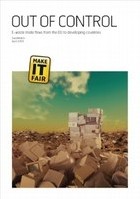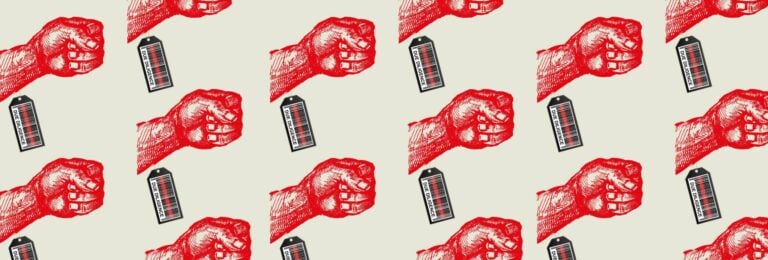
Out of control. E-waste trade flows from the EU to developing countries
As the consumption of electronics has increased rapidly the last years, so has the waste made up of discarded products. E-waste often contains ingredients that risk damaging human health and polluting the environment. In a new report ‘Out of control. E-waste trade flows from the EU to developing countries’, makeITfair provides a critical analysis of the e-waste trade flows to developing countries and offers solutions to exacerbate the negative effects.
When it comes to the burden of e-waste, several developing countries in Asia and Africa that lack proper systems for recycling and disposal are experiencing increasing problems; firstly because consumption of electronics is increasing most within these countries at present, and secondly because e-waste is exported from the rich world to developing nations that lack the capacity and regulations to handle this waste in a responsible manner.
During rudimentary recovery by informal recyclers in countries such as China, India, Ghana and Nigeria workers are exposed to hazardous chemicals and material when products are broken apart in order to extract valuable components and metals. A study published in 2007 showed that children in the Chinese recycling town Guiyu had much higher blood lead levels than children living in a settlement where recycling of electronics did not take place. Other health problems that have been reported include diseases and problems related to skin, stomach, respiratory tract and other organs.
E-waste contains a variety of hazardous metals and organic compounds. The content of electronics collected in the EU will become less problematic over the next few years when the effects of the Restriction of Hazardous Substances Directive (RoHS) will be fully developed, which makes the producers phase out some of the most hazardous substances. However, the restrictions of RoHS only apply to products put on the market after 1 July 2006. Moreover, risks related to some of the other content are still poorly documented. More than 200 chemicals compounds are included in a single mobile phone, for example, and all possible effects of the content on humans and the environment have not been fully studied.
Exports of WEEE to developing countries are banned according to EC legislation (the Waste Shipment Regulation). New EC legislation also requires that the cost of properly disposing of electronic products must be picked up by the producers of the waste (the WEEE Directive).
Over the last few years, several electronics companies have increased their efforts to phase out hazardous materials, spurred by legislative and consumer demands. Creative minds at several electronics companies have been set in motion in order to produce more ecofriendly products that are easier to recycle and handle when they reach their end-of-life. On the market as a whole there is still room for improvement, though.
Regarding e-waste collection in general, the average annual collection rate within the EU is about five kilos per person, while it is expected that each inhabitant generates 15 kg of e-waste annually. Within the EU as a whole, it is estimated that 25% of the medium-sized appliances and 40% of the larger appliances are collected and treated. The rest, the remaining 60% to 75%, represents what Greenpeace International calls “the hidden flow”. No one currently knows the scale of the EU’s e-waste exports to developing countries, but there is evidence that it does occur. Some experts fear that these exports will increase as an unanticipated result of EU’s environmentally sound directives.
The trade in second-hand electronics generates both positive and negative effects. The final disposal and treatment of the products will take place in countries where proper disposal and treatment systems are lacking and brands and retailers are not required to take back products nor pay the actual costs. National statistics in different EU countries, showing shipments of electronics that have been declared as actual products and not waste, indicate that parts of the exported electronic goods might be waste or second-hand products with unknown additional lifetime. In this context, countries in Africa and the Middle East seem to be important recipients.
Due to the low number of port inspections in the EU as a whole, Customs are not aware of the age and the quality of these exported products. Custom officials in many EU member states point out that they lack resources necessary to learn about the contents of shipments leaving their countries. In general narcotics, alcohol, tobacco and financial crimes are issues of priority, not illegal shipments of waste.
What should be done?
Within the industry as a whole much more can be done regarding, for example, hazardous content, take back and possibilities of upgrading software instead of having to buy new products. Reducing the hazardous content is therefore vital, together with the setting up of well-functioning and sustainable collection and recycling systems.
Apart from reducing the hazardous content and designing products that are easy to recycle, electronics companies should offer take back and sustainable recycling even in countries where the law does not require this.
Finally, consumers must be made aware of the need for recycling of old electronics. Research presented by Nokia shows that globally only 3% of consumers recycle their phones.
Companies selling second-hand electronics also present an alternative to individual consumers, companies and institutions who are not interested in the latest models but want to reduce the ecological footprint of the products they buy. Companies exporting second-hand goods to countries outside the EU should, however, avoid selling to brokers and carefully control the effects of their exports on developing countries.
Related news
-
 The hidden human costs linked to global supply chains in ChinaPosted in category:News
The hidden human costs linked to global supply chains in ChinaPosted in category:News Joshua RosenzweigPublished on:
Joshua RosenzweigPublished on: -
 Major brands sourcing from China lack public policies on responsible exitPosted in category:News
Major brands sourcing from China lack public policies on responsible exitPosted in category:News Joshua RosenzweigPublished on:
Joshua RosenzweigPublished on: -


